J. Bradford DeLong's Blog, page 183
May 10, 2019
Note to Self: Comment on Richard Baldwin: The Globotics...

Note to Self: Comment on Richard Baldwin: The Globotics Upheaval: Globalization, Robotics, and the Future of Work: Start from the observation the the human brain is a massively-parallel supercomputer that fits inside a breadbox and draws 50 watts of power.
For 6,000 years, since the domestication of the horse, human backs, human thighs, and human fingers have becoming less powerful as sources of economic value, as animals and machines have increasingly competed with and substituted for them. Up until recently, however, every domesticated animal every machine had required a microprocessor. And the highly-productive decentralized societal division of labor of enormous extent created huge and increasing amounts of need for white-collar information processing: the accounting, control, transmission of information, and purveyance of misinformation jobs that are most of what people like us here do. Thus while human backs and thighs and fingers became less powerful as sources of economic value as time passed, human brains become more valuable. But now we have robots which contain their own microprocessors, and software 'bots that handle huge amounts of the white-collar information processing. So the job-creating aspects of technological creative destruction are now open to question
From this standpoint, we can worry along either of two dimensions:
We can worry that right now we are about to have another wave of globalization���which Richard Baldwin calls "Telemigration" and "'Botic Process Automation"���that is going to expose not just manufacturing jobs but any job that can be done through a computer screen or with teleoperated waldoes to global competition. This will hit a world of absolutely enormous and extraordinary income and wealth inequality. And the shock to wages of workers around the globe will be world-shaking.
Or we can go worry by reflecting on the fact that a horse is an extremely powerful, very intelligent, good natured, socially-cooperative herd animal that has been of great use to humans for 6,000 years. Up until the 1920s, if there was a horse in America, there was a us4e gor the horse���a job it could do that was worth much more than its feed. But in the 1920s we hit peak horse. Since then, the marginal horse that is born is worth more as dog food than as its highly-intelligent, very-cooperative, very-powerful, easily-socialized and agreeable domesticated animal self.
The first, I think, is a 20-year worry. The second, I think, is a 100-year worry.
#economicgrowth #equitablegrowth #riseoftherobots #technology #books #highlighted #commentoftheday
Danny Blanchflower: Not Working: Where Have All the Good ...
Danny Blanchflower: Not Working: Where Have All the Good Jobs Gone?: "Don't trust low unemployment numbers as proof that the labor market is doing fine���it isn't. Not Working is about those who can���t find full-time work at a decent wage���the underemployed���and how their plight is contributing to widespread despair, a worsening drug epidemic, and the unchecked rise of right-wing populism.... Blanchflower draws on his acclaimed work in the economics of labor and well-being to explain why today's postrecession economy is vastly different from what came before. He calls out our leaders and policymakers for failing to see the Great Recession coming, and for their continued failure to address one of the most unacknowledged social catastrophes of our time. Blanchflower shows how many workers are underemployed or have simply given up trying to find a well-paying job, how wage growth has not returned to prerecession levels despite rosy employment indicators, and how general prosperity has not returned since the crash of 2008.... Blanchflower practices the 'economics of walking about'���seeing for himself how ordinary people are faring under the recovery, and taking seriously what they say and do. Not Working is his candid report on how the young and the less skilled are among the worst casualties of underemployment, how immigrants are taking the blame, and how the epidemic of unhappiness and self-destruction will continue to spread unless we deal with it...
#noted #books #labormarket #equitablegrowth
It is power and surveillance rather than worker displacem...
It is power and surveillance rather than worker displacement that is the principal issue on the table with respect to automation for the next decade, and probably for the next two decades: Brishen Rogers: Beyond Automation: The Law & Political Economy of Workplace Technological Change: "This article unpacks the relationship among advanced information technologies, employment law rules, and labor standards. Based on a detailed review of the capacities of existing technologies, it argues that automation is not a major threat to workers today, and that it will not likely be a major threat anytime soon. Companies are, however, using new information technologies to exercise power over workers in other ways, all of which are enabled by existing employment laws. For example, they are increasingly using algorithms to monitor, direct, or schedule workers, in the process reducing workers��� wages or autonomy. Companies are also using new technologies to ���fissure��� employment: outsourcing work tasks or processes and then disclaiming legal duties toward workers, all while closely monitoring workers��� performance. These findings have policy implications. If the major threat facing workers is employer domination rather than job loss, then exotic reforms such as a universal basic income are less urgent. Rather, policymakers could expand the scope and stringency of companies��� duties toward their workers, and/or enable workers to contest the introduction of new workplace technologies...
#noted
Where Frank Fukuyama Went Wrong; or, Zombie Fascism!!

Brad DeLong: Council on Foreign Relations: The Future of Democracy Symposium: Session Two: Economics, Identity, and the Democratic Recession: this political moment���Louis Napoleon mobilized these kinds of sentiments to overthrow the French Second Republic and establish himself as emperor. Francis Fukuyama wrote an excellent article about how really-existing-socialism���public ownership of the means of production, hopefully leading someday to the free society of associated producers���had crashed and burned, and that the only big idea left about how to organize society was that of liberal market democracy. But Fukuyama made a key mistake: there had been a third challenge. That is the basally-Roman idea thateach of us is individually a stick, very weak, but if we can unite ourselves in a big bundle of sticks and if we can tie ourselves together in leather thongs, we then become a powerful force that, in the hands of our strong leaders, could bruise our enemies.
Francis Fukuyama thought that this political movement had been dead and buried by 1945.
It looks like he was wrong.
If you look at Hungary���as we saw before���if you look at India today���where the government seems to be trying National Hinduism, casting the Muslims of India in the role traditionally ascribed to the Jews���if you look at an awful lot of place, the idea of taking people���s attention on the right believe they aren���t getting their fair share from the system and pointing it at internal or external enemies that you can despise or blame: this seems to be a remarkably powerful movement today.
It appears wherever the rapid economic growth needed to guarantee that pretty much everything thinks "well, I���m living significantly better than my parents" fails. We���ve seen this before. We have come out of this before. But that doesn���t mean we should say this is no big deal. It���s always been a big deal. So far, at least, the United States and Britain, at least, have been very lucky whenever such political movements have arisen. But will we always be lucky? Are we being lucky now?
#history #politicaleconomy #fascism #orangehariedbaboons #highlighted
May 10, 2019: Weekly Forecasting Update: Little Change
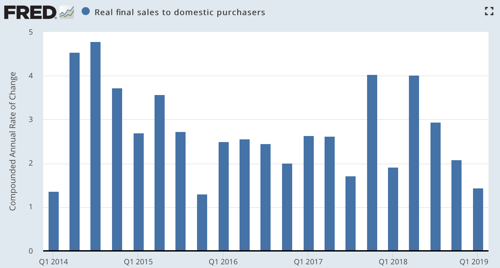
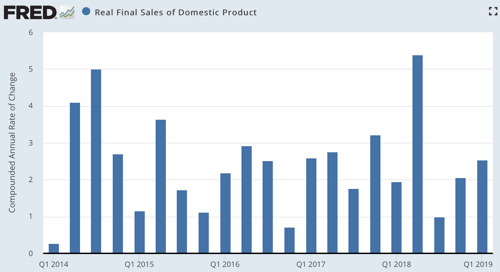
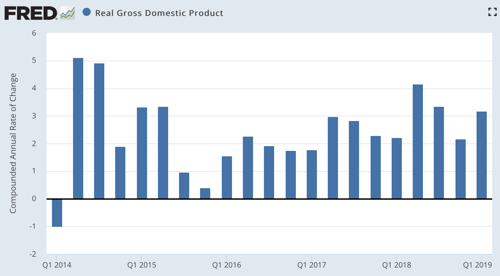
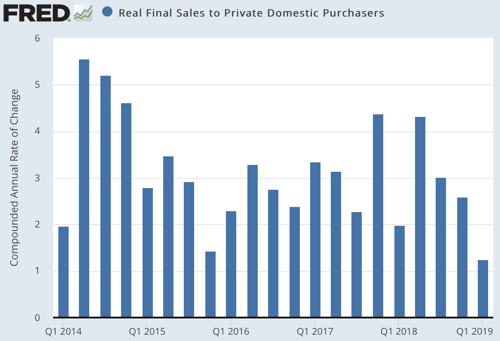
Federal Reserve Bank of New York: Nowcasting Report: "The New York Fed Staff Nowcast stands at 2.2% for 2019:Q2. News from the JOLTS, CPI, PPI, and international trade releases left the nowcast for 2019:Q2 broadly unchanged...
Key Points:
The right response to almost all economic data releases is: Nothing has changed���your view of the economic forecast today is different from what it was last week, last month, or three months ago in only minor ways.
What has changed in the past week is: The falling-apart of Trump's trade negotiating strategy with China will harm Americans and may disrupt value chains, but the effects are unlikely to be clearly visible in the data flow.
It is still the case that U.S. potential economic growth continues to be around 2%/year, that inflation is unthreatening, and tha trhe donomy is closing in but not yet at full employment.
It is also the case that:
There are still no signs the U.S. has entered that phase of the recovery in which inflation is accelerating.
There are still no signs of interest rate normalization: secular stagnation continues to reign.
There are still no signs the the U.S. is at "overfull employment" in any meaningful sense.
The Trump-McConnell-Ryan tax cut delivered a substantial short-Term demand-side fiscal stimulus to growth that has now ebbed.
(A 3.2%/year rate of growth of final sales to domestic purchasers over the seven quarters starting in January 2017, pushing the level of Gross National Income up by 2.1% from this demand-side stimulus.)
The Trump-McConnell-Ryan tax cut has been a complete failure at boosting the supply side through increased investment, and a complete success at making America more unequal.
A change from 3 months ago: The Federal Reserve's abandonment of its focus on policies that are likely to keep PCE chain inflation at 2%/year or lower does not mean that it is preparing to do anything to avoid or moderate the next recession.
A change from 1 month ago: The U.S. grew at 3.2%/year in the first quarter of 2019���1.6%-points higher than had been nowcast���but the growth number you want to put in your head in assessing the strength of the economy is the 1.6%/year number that had been nowcast.
A change from 1 week ago: The falling-apart of Trump's trade negotiating strategy with China will harm Americans and may disrupt value chains, but the effects are unlikely to be clearly visible in the data flow.
#macro #forecasting
May 9, 2019
Note to Self: If, after the EMP data wipeout and the coll...
Note to Self: If, after the EMP data wipeout and the collapse, future raccoon historians of fascism dig up this statue, they are going to be very confused:
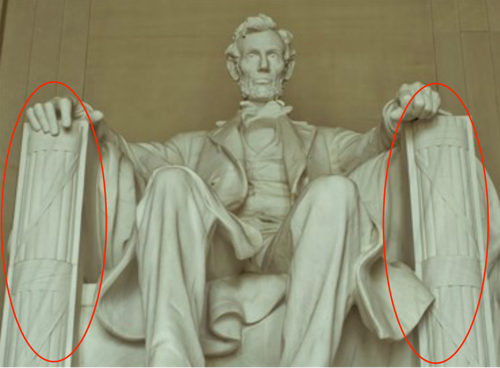
#notetoself #fascism
May 8, 2019
Note to Self: Richard M. Johnson (1780-1850), Vice Pres...

Note to Self: Richard M. Johnson (1780-1850), Vice President and Senator, and Julia A. Chinn (1790-1833), slave and ch��telaine:
Wikipedia: Richadf Mentor Johnson
BlackPast: Julia Ann Chinn
Keven McQueen (2001): Offbeat Kentuckians: Richard M. Johnson
Leland Winfield Meyers (1932): The Life and Times of Colonel Richard M. Johnson of Kentucky
James A. Padgett (1940): The Letters of Colonel Richard M. Johnson of Kentucky
Abraham Lincoln (September 18, 1858): Fourth Debate with Stephen A. Douglas at Charrleston, Illinois: "I have never seen to my knowledge a man, woman or child who was in favor of producing a perfect equality.... I recollect of but one distinguished instance... the case of Judge Douglas' old friend Col. Richard M. Johnson [Laughter]...
Abraham Lincoln (September 18, 1858): Fourth Debate with Stephen A. Douglas at Charleston, Illinois: "While I was at the hotel to-day an elderly gentleman called upon me to know whether I was really in favor of producing a perfect equality between the negroes and white people. [Great laughter.] While I had not proposed to myself on this occasion to say much on that subject, yet as the question was asked me I thought I would occupy perhaps five minutes in saying something in regard to it...
...I will say then that I am not, nor ever have been in favor of bringing about in any way the social and political equality of the white and black races [applause]���that I am not nor ever have been in favor of making voters or jurors of negroes, nor of qualifying them to hold office, nor to intermarry with white people; and I will say in addition to this that there is a physical difference between the white and black races which I believe will for ever forbid the two races living together on terms of social and political equality. And inasmuch as they cannot so live, while they do remain together there must be the position of superior and inferior, and I as much as any other man am in favor of having the superior position assigned to the white race.
I say upon this occasion I do not perceive that because the white man is to have the superior position the negro should be denied everything. I do not understand that because I do not want a negro woman for a slave I must necessarily want her for a wife. [Cheers and laughter.] My understanding is that I can just let her alone.
I am now in my fiftieth year, and I certainly never have had a black woman for either a slave or a wife. So it seems to me quite possible for us to get along without making either slaves or wives of negroes. I will add to this that I have never seen to my knowledge a man, woman or child who was in favor of producing a perfect equality, social and political, between negroes and white men. I recollect of but one distinguished instance that I ever heard of so frequently as to be entirely satisfied of its correctness���and that is the case of Judge Douglas' old friend Col. Richard M. Johnson. [Laughter.]
I will also add to the remarks I have made, (for I am not going to enter at large upon this subject,) that I have never had the least apprehension that I or my friends would marry negroes if there was no law to keep them from it, [laughter] but as Judge Douglas and his friends seem to be in great apprehension that they might, if there were no law to keep them from it, [roars of laughter] I give him the most solemn pledge that I will to the very last stand by the law of this State, which forbids the marrying of white people with negroes...
Keven McQueen (2001): Offbeat Kentuckians: Richard M. Johnson: One of Franklin D. Roosevelt���s vice presidents, John Nance Garner, famous lamented, "The vice presidency isn't worth a pitcher of warm spit.��� However, on occasion we encounter a vice president whose performance itself isn't worth a pitcher of warm spit. One of these was Kentucky's Richard M. Johnson.
Johnson was born on October 17, 1780 (some sources claim 1781), when much of Kentucky was still the untamed frontier. The site of his birth was a settlement called Beargrass, now known more familiarly as Louisville. Shortly thereafter, the family moved first to Bryant's Station, near Lexington, and then to Scott County.
According to relatives, when he was a young man Johnson fell in love with a woman who was either a schoolteacher or a seamstress. He wanted to marry her, but his mother forbade the union. Deeply hurt, Johnson vowed she would regret her interference some day. His revenge was many years delayed, but when it finally came it caused a major political and social scandal.
Johnson's career in politics started normally enough. He attended Transylvania University in Lexington, then afterwards studied law. He became a professional lawyer at age 19. Upon developing an interest in politics, he became a member of the General Assembly from 1804-06 and was elected to the House of Representatives in 1807. His career in the House was interrupted by the War of 1812. Johnson, a commissioned Army colonel, led a regiment of volunteers to Canada in 1813, where they fought the British and the Indians. The military engagement that made Colonel Johnson nationally famous was the Battle of the Thames on October 5, 1813. This was the fight that resulted in the death of the Shawnee Indian leader Tecumseh. a figure much feared by settlers.
Johnson was said to have killed Tecumseh. but he was just one of several Indian fighters who took credit for the deed. The real identity ofTecumseh���s killer remains a hotly debated historical mystery; the best that can be said for Johnson's claim is that he is as likely to have done it as anybody else. At any rate. the popular assumption that Colonel Johnson was the one who permanently removed the threat of Tecumseh from the frontier certainly did no harm to his political career.
It is true that Johnson behaved with great valor while at war. At the Battle of the Thames, an astonishing 25 bullets allegedly struck either Johnson or his horse, and he had to be carried from the battlefield with wounds in his hip and thigh. When he returned to his seat in the House of Representatives in February 1814, he was lauded as a hero.
He remained in the House until 1819, when he was elected to the Senate. For the next several years, until 1837, Johnson was continuously a member of either the Senate or the House. It was said for a while that in Kentucky, Johnson was "more popular even than Henry Clay.���
If Johnson had died earlier in his career, he would be remembered today as an early American career politician, Kentucky's major Democratic congressman of the early 19th century, and for his bravery
in combat. Instead, his political legacy was affected by his personality, which became increasingly erratic and disagreeable with the passage of time, to the point where many observers seriously questioned his sanity. Richard Johnson���s story becomes a strange one indeed after such a promising beginning.
Unfortunately for his image, Johnson had a talent for repelling others. Described by one observer as "the most vulgar man of all vulgar men in this world," Johnson was notorious for his bad taste in clothing and poor grooming. His personal life became the talk of his enemies and even members of his own party. An unabashed seducer, ���he was known to have had sexual flings with the wives of at least four senators and congressmen, and the suspicion existed of at least three more,��� according to writer Carl Sifakis.
That was just scratching the surface of personal scandal. When his father died, Johnson finally saw his chance to pay his mother back for interfering in his choice of a bride. He inherited a mulatto slave
named named Julia Chinn, and soon made her his mistress. Johnson was quite open about the well-publicized relationship. He introduced Chinn as his wife (though in actuality Johnson never married), even after he became a Senator and entered Washington society. She bore him two daughters, Adaline and Imogene, whom Johnson insisted on treating as his own legal children, even having them educated and introducing them into society. Both women later married white men and were given generous tracts of land by their father. Furthermore, Scott County court records reveal that he freed many of his other slaves. His open affair with Julia Chinn would return to haunt Johnson repeatedly through his
political career by giving his enemies plenty of ammunition with which to attack him, but he never backed down.
But this does not mean Johnson was an especially enlightened man. After Julia died in Lexington's cholera epidemic of 1833, he indulged in relations with a second slave mistress. When the second one
ran off with another man, Johnson had her captured and then sold her at auction. Then he made her sister his third mistress.
To be fair, some of Johnson���s legislative accomplishments were quite farsighted. He was instrumental in abolishing the debtor���s prison in America in 1832, though it took 10 years of constant lobbying, and
he made great strides in Indian education. But in keeping with his unstable nature, Johnson also used the Senate floor to discuss strange pet projects. For example, in 1823 he championed the bizarre hollow earth theories of fellow veteran Captain John Cleves Symmes. Johnson even tried to persuade Congress to pass a bill that would fund an expedition to the center of the earth. The bill received only twenty-five votes and was soundly defeated.
In 1836 President Andrew Jackson chose his vice president, Martin Van Buren, to be his successor. The problem was, Van Buren himself would need a vice president. Though by the mid-1830s Congressman Johnson was definitely looking like a liability to his party, he was hand-picked by Jackson himself to be the running mate for Van Buren. (Five years earlier, when Johnson���s vice presidential ambitions
became known, John Tyler had quipped in reference to the former���s habit of using his war wounds to attract votes, ���The day is rapidly approaching when an ounce of lead will in truth be worth more than a
pound of sense.���) Andrew Jackson felt that despited Johnson���s antics, his reputation as an Indian fighter and war hero was good for the ticket. Also, he had always been loyal to Jackson, and Jackson was a big believer in the spoils system.
Van Buren did become president in 1837, and vice president Johnson immediately began alienating his peers and the voters with his outrageous behavior. His licentiousness continued unchecked. He cared
so little for his duties as vice president that he spent more time at home in Kentucky than in Washington. Indeed, while the country suffered from the financial Panic of 1839, Johnson announced that he was taking a nine-month leave of absence while receiving his full salary.
During this paid vacation, Johnson devoted his energy to opening and publicizing a tavern and spa on his farm in White Sulphur Spring, KY. His celebrity drew in many paying customers, one of whom noted in a letter to Amos Kendall, a member of the Van Buren cabinet, "the Vice President of these United States, with all his civic and military honors clustering around his time honored brow, is, or seems to
be happy in the inglorious pursuit of tavern-keeping," and further noted that Johnson seemed preoccupied with nothing more serious than buying eggs and selling watermelons. The suggestion seemed to be that Johnson was much more suited for tavern-keeping than being a heartbeat away from the presidency.
The Democrats finally had enough of Johnson. Even his former supporter Jackson had to admit in a letter to Van Buren that Johnson was "dead weight," and that "...if Col. Johnson is the nominee [for vice president], it will loose [sic] the democracy thousands of votes���jeopardize this state [Tennessee] and surely loose Kentucky... Col. Johnson was the weakest candidate named." When Van Buren ran for reelection in 1839, the party's convention refused to nominate Johnson, or anyone else for that matter, for the vice presidential chair. In other words, Martin Van Buren became the only presidential candidate in American history who had no running mate whatsoever.
A lesser man would have been mortified, but Johnson ran for president himself as an independent candidate. He embarked on a campaign which was highlighted by his bizarre behavior. Even his sympathetic biographer Leland Meyer remarked that "His manners in this most scurrilous campaign in American history were not above reproach." He was criticized for making "incoherent, rambling" speeches. The Kentucky Gazette of July 11, 2839, reprinted a report from the Scioto Gazette claiming that while stumping in Ohio, Johnson displayed his battle scars to the audience. The article also delivered a few tongue-in-cheek compliments; "What though he does crave credit for valiant feats he never performed, has he no precedent for it?.... What if he did not write [the famous Sunday Mail Report]? It requires a man of some ingenuity to palm off the production of another as his own."
During that campaign of 1840, the memorable Whig slogan was "Tippecanoe and Tyler, too." Someone in the
Johnson camp���some have suggested it was Johnson himself���reflected that their candidate was himself a hero of the War of 1812, and composed a rival campaign slogan: "Rumpsey dumpsey, Rumpsey dumpsey! Colonel Johnson killed Tecumseh!" (However, there is evidence the slogan existed as early as 1824.) This campaign jingle is fondly remembered by historians as one of the most moronic ever devised. Johnson was trounced at the polls, receiving only 48 electoral votes. The crowning embarrassment was that he did not carry Kentucky, his home state.
Richard Johnson returned to Congress in 1841, but again attempted unsuccessfully to run for president in 1844. After this defeat, he retired to his tavern in Kentucky. In 1850 he was elected to the House of Representatives.
However, though elected he was unable to serve. His longstanding erratic behavior had finally turned into outright mental illness. The Frankfort correspondent for the Louisville Daily Journal of November 9, 1850, informed its readership: "Col. R.M. Johnson is laboring under an attack of dementia, which renders him totally unfit for business. It is painful to see him on the floor attempting to discharge the duties of a member. He is incapable of properly exercising his physical or mental powers. The veteran form that has filled so many important posts in civil life and born itself so gallantly upon the battlefield seems to totter, and the mind which vivified it seems to flicker and wane in a dim uncertain light."
Richard Johnson died in Frankfort of a stroke on november 19, 1850. His uniqueness lives after him: he remains the only vice president who was so unpopular that he was elected to the office by Congress rather than by popular vote, in accordance with Amendment XII of the Constitution.
Plutarch: Life of Tiberius Gracchus: "This is said to hav...
Plutarch: Life of Tiberius Gracchus: "This is said to have been the first sedition at Rome, since the abolition of royal power, to end in bloodshed and the death of citizens; the rest though neither trifling nor raised for trifling objects, were settled by mutual concessions, the nobles yielding from fear of the multitude, and the people out of respect for the senate. And it was thought that even ��p193��on this occasion Tiberius would have given way without difficulty had persuasion been brought to bear upon him, and would have yielded still more easily if his assailants had not resorted to wounds and bloodshed; 2��for his adherents numbered not more than three thousand. But the combination against him would seem to have arisen from the hatred and anger of the rich rather than from the pretexts which they alleged; and there is strong proof of this in their lawless and savage treatment of his dead body...
#noted
It Was Political Decisions, Not Trade or even Technology, That Done It...

Note to Self: From Council on Foreign Relations: The Future of Democracy Symposium: Session Two: Economics, Identity, and the Democratic Recession: Over 2001���2008 the furniture workers who had lost their jobs because of NAFTA and the China shock were getting new and better jobs in construction, building up Raleigh and Durham. Few unhappy about the economic transformation of the Carolinas until late 2008. Then, all of a sudden, it turned out that a great many securities rated AAA by Moody���s and Standard & Poor���s in fact had no business being sold to anyone at any price at all; the Democrats did not prioritize a return to full employment; and the Republicans prioritized a non-return to full employment in the hope of weakening a Democratic president. Economic anxiety producing racial cleavage, yes. But it was political decisions, not trade or even technology that done it.
#notetoself #politicaleconomy #orangehariedbaboons #globalization #technology #fascism
If You Were Right, John, Then Massachusetts Politics Would Have Turned This Strange Weird Trumpist Flavor Back in the 1950S

Note to Self: From Council on Foreign Relations: The Future of Democracy Symposium: Session Two: Economics, Identity, and the Democratic Recession: Look at me: Harvard Ph.D., Harvard B.A., Harvard B.A ancestors back to 1686 or whenever, Sidwell Friends School, and before that Cal Tech nursery school. But my wife grew up���first generation in her family to go to college���in a Portuguese neighborhood of Fall River, where everyone���s parents and grandparents worked in the textile mills. The textile mills of Fall River were stripped by Greensboro, North Carolina. They took the jobs away from the Portuguese millworker immigrants of Fall River. They stole that identity.
And their grandchildren are absolutely fine with that.
Their grandchildren are fine with being part of the Greater Boston Rootless Cosmopolite elite. They are they are grandchildren of millworkers. But they do not think that they want those jobs, that particular identity, back. They think they have Better jobs, and a new, better identity. If you were right, John, then Massachusetts politics would have turned this strange weird Trumpist flavor back in the 1950s and 1960s. It didn't. Why not?
Over 2001���2008 the furniture workers who had lost their jobs because of NAFTA and the China shock were getting new and better jobs in construction, building up Raleigh and Durham. Few unhappy about the economic transformation of the Carolinas until late 2008. Then, all of a sudden, it turned out that a great many securities rated AAA by Moody���s and Standard & Poor���s in fact had no business being sold to anyone at any price at all; the Democrats did not prioritize a return to full employment; and the Republicans prioritized a non-return to full employment in the hope of weakening a Democratic president. Economic anxiety producing racial cleavage, yes. But it was political decisions, not trade or even technology that done it.
#notetoself #politicaleconomy #orangehariedbaboons #globalization #technology #fascism
J. Bradford DeLong's Blog
- J. Bradford DeLong's profile
- 90 followers



